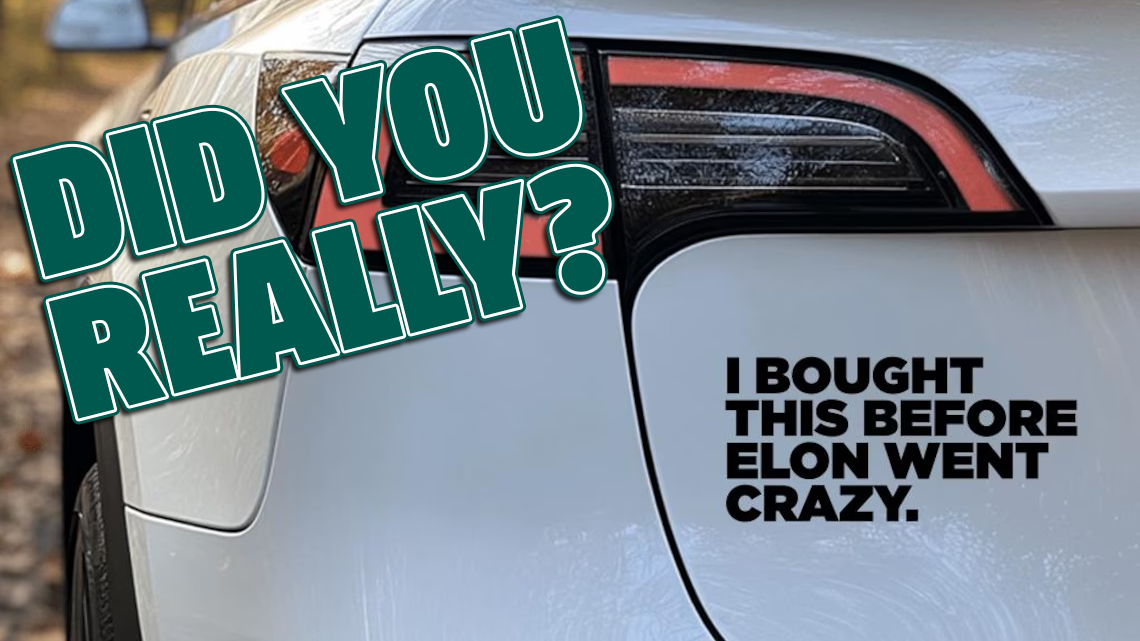The Cut Off For Those 'I Bought This Before I Knew Elon Was Crazy' Stickers Is 2018
How long did it take you to figure Elon's deal out?
We may receive a commission on purchases made from links.
Elon Musk is a salesman, and recently he's been selling two things: Electric cars and eugenics-backed fascism. His pitches for the latter have gotten loud enough that folks who bought into the former can no longer quietly ignore it, which has led to all sorts of Tesla owners plastering their cars with stickers that read some variation on "I bought this before Elon went crazy." Here's the thing: I don't think they did.
We've known for a long time that Musk isn't all above-board. It's particularly egregious on Cybertrucks, a vehicle Tesla didn't release until long after Musk began showing his true colors, but the same can be said for the best-selling Model Y — by 2019, when that crossover launched, we'd already seen Musk's worst side at least a year earlier. Let's go to the tape.
If you have an original Roadster with this sticker, you're in the clear. Sure, Musk had bought his way into Tesla by 2008, but back then he appeared to largely be just some guy. Unless you knew the phrase "PayPal Mafia," Musk just seemed to be a guy who wanted to make electric cars cool. Twitter wasn't even around yet. You're fine.
Fast forward to the launch of the Model S in 2012, and you still would have purchased from a Musk who still outwardly cared about the climate. He was cringe online in some of the same ways — his Twitter bio included the location "1 AU," meaning Earth — but he was largely some harmless dork. He was an Obama fan, he tweeted about his companies and his thoughts on "The Dark Knight Rises" instead of far right conspiracy theories. If you have an early Model S, your sticker is justified.
By the time of the Model X's launch in 2015, Musk's eccentricities were showing through. We had the falcon wing door debacle on a car that came with a "bioweapon defense mode" — not things that come from normal car companies with normal CEOs. Musk was getting weirder and weirder, less and less tethered by the bounds of societal norms, but he wasn't yet doing so in ways that hurt people.
In 2018 we got the launch of the Model 3 in all its tent construction, bumpers falling off, panel gap glory. Tesla's clothes were looking a bit transparent, and Musk started pulling his personal mask off. He was reading cult media (not the fun "Rocky Horror Picture Show" kind), getting paranoid about sabotage at Tesla's Fremont plant, and most famously calling the diver who saved a cave-trapped soccer team a pedophile. This wasn't a one-off tweet, this was a genuine belief that Musk backed up multiple times and eventually faced a lawsuit over — a suit that revealed Musk's larger distrust in the media, which would eventually lead to his takeover of Twitter and reorganization of that platform to benefit the far right.
The Musk of 2018 was a man who reportedly aggressively pursued whistleblowers, and who famously tweeted that he had "funding secured" to take Tesla private at a price allegedly chosen in an attempt to impress electronic musician Grimes with a weed joke. This was the year where Musk grew beyond the position of "space and EV guy" into being a a person known for his antics, a move that made the world worse for everyone.
If you purchased a Tesla after this, you really should've known what you were getting yourself into. The dam broke in 2018, and the years that followed brought more and more groyper-tinged fascism that led straight to today: A world where Elon Musk controls the Treasury Department of the United States of America. If you drive a Model Y or Cybertruck — both vehicles introduced after Musk's heel turn — your lack of knowledge about Musk's actions is on you.
You're welcome to slap that sticker on your car. You can be one of today's lucky 10,000 — learning more about the world around you is always better than the alternative. But if you own a post-2018 Tesla, and you're only now learning the type of person who got the money from your purchase, it's worth interrogating why. Think about where you get your news, the perspectives and opinions you get in your daily life. Then, scrap them all and tune in to the only news source that matters: Jalopnik.
